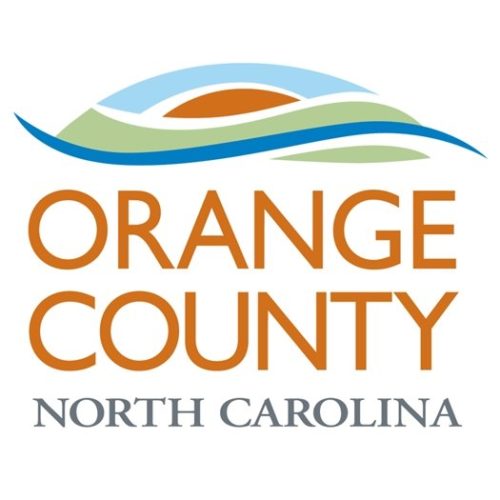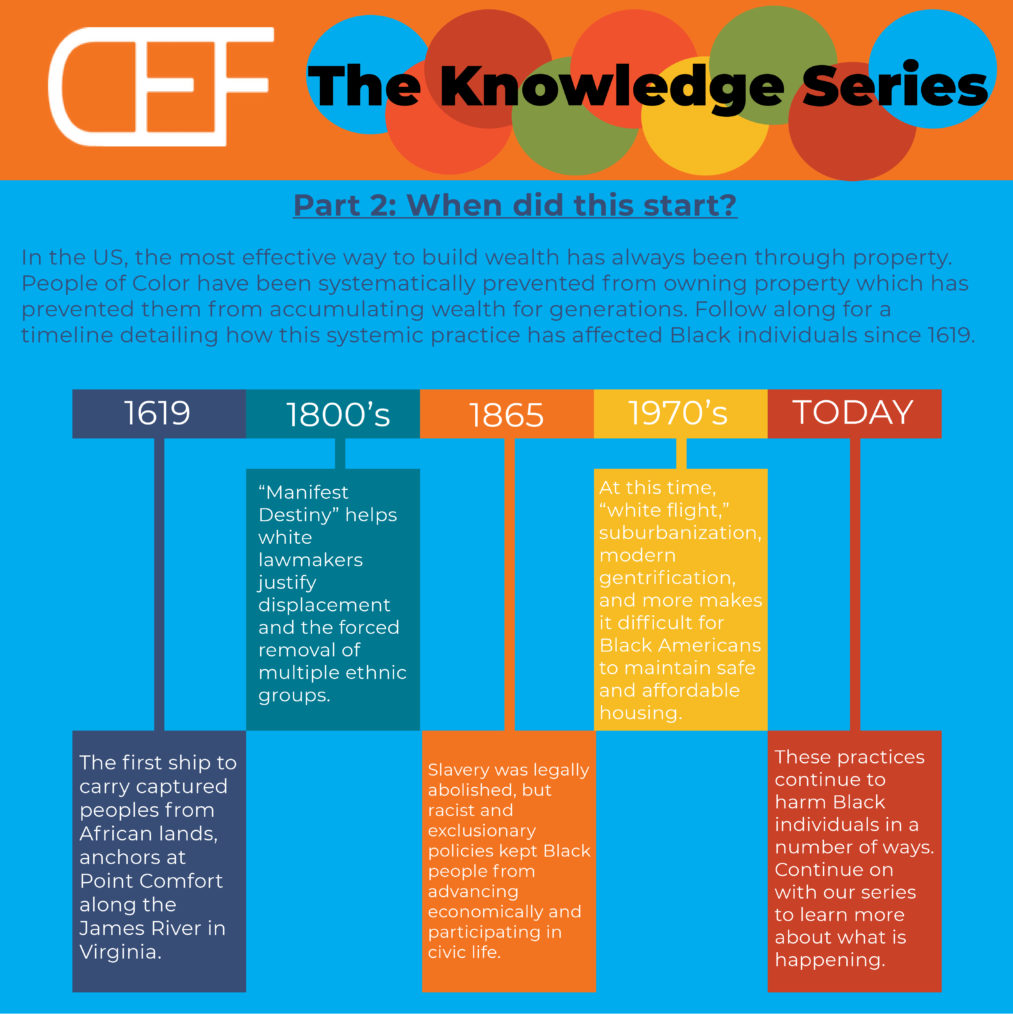Share the Love: Art Show 2021
Thank you to everyone who made CEF’s first virtual Art Show a big success!
We are grateful for to everyone who attended and your insightful comments. Thanks for showing your appreciation to each of the artists. We hope you enjoyed the amazing presentations, from Kohl’s 2D sticker bomb art to Robin Ess’ powerful performance of “Soulfully.” Here at CEF, we believe that everyone is creative, resourceful, and whole. We are so excited we had the chance to share the abundance of creativity with you.
For those who were not able to attend the art show, we have posted a recording of the show to the CEF website for you to enjoy! Click here to find that recording and feel free to download the program guide, watch the show, and reach out to any of the participants to inquire about purchasing their art!
We hope to see you at the next virtual art show!
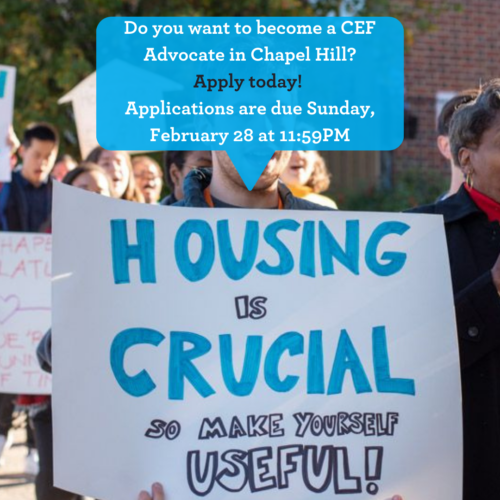
Become a CEF Advocate in Chapel Hill
CEF Chapel Hill is looking for new Advocates!
We are looking for more talented and dedicated Advocates to work with Members and assist them in reaching their goals. Advocates will need to be able to commit to working with Members before, during, and beyond their transitions out of housing insecurity!
Advocates are not required to have background knowledge, as CEF provides initial and on-going training but Advocates are required to be lifelong learners.
The CEF Chapel Hill Advocates will have mandatory trainings on May 18, 19, and 20 from 5:30-8:30pm EST. Applications are due by Sunday, February 28, 2021.
Learn more about being an Advocate and apply here!
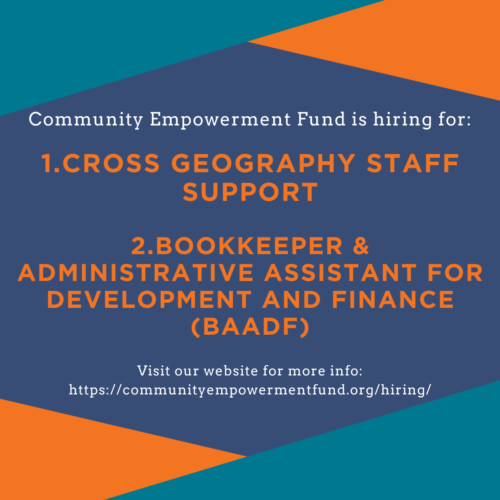
CEF is hiring
There are two open positions we are looking to fill!
The Cross Geography Staff Support role is a part-time position focused on supporting CEF’s Durham and Chapel Hill, NC offices. This is an in-person position, though some meetings may be attended remotely. The Cross Geography Staff Support will be responsible for providing a consistent and welcoming presence for Members and Advocates during office hours by staffing office hours and working one-on-one with Members in the office. They will also be supporting the Office and Community Organizer with any duties to ensure COVID-19 and safety protocols are followed by staff, Advocates, and Members. Applications for this role will be accepted until the position is filled.
The Bookkeeper & Administrative Assistant for Development and Finance (BAADF) role is a full-time, salaried position that works closely with CEF’s Director of Development & Finance. The BAADF will support Finance efforts by tracking income and expenses in quickbooks, development efforts by supporting the donor thank you process, and communication efforts by creating and posting on CEF’s social media channels.The BAADF will have a combination of on- and off-site work; some tasks and duties will be performed in both CEF’s Chapel Hill and Durham offices (primarily in Chapel Hill), and other tasks will be completed remotely. Applications for this role are due Friday, February 26, 2021.
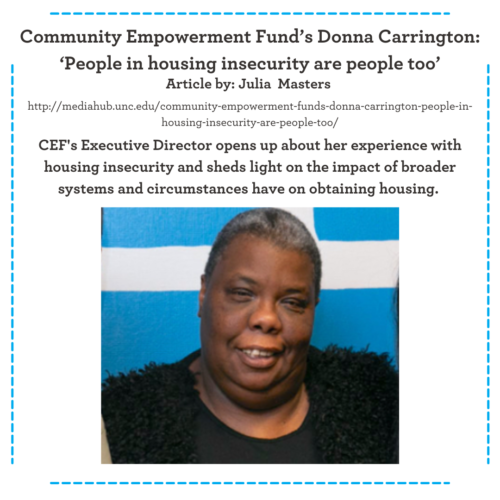
CEF’s Executive Director Sits Down with UNC Media Hub
‘People in housing insecurity are people too’
CEF Executive Director, Donna Carrington, recently had a chat with Julia Masters from UNC Media Hub.
During this conversation, Donna discusses her experience with housing insecurity and how that informs her leadership at CEF, her vision for the organization, and her demands for Durham and Orange county in regards to affordable housing and community support.
Click here to read Julia’s article on their conversation. Thank you to Julia for providing a safe space for Donna to share her story.

Resources of the Month
Orange County Resource of the Month:
This month, Diiv would like to highlight the Orange County VITA Program. The Volunteer Income Tax Assistance (VITA) program is a volunteer program that provides individuals with low-income, free federal and NC state income tax preparation.
As a result of COVID-19, the program now offers various options for contactless filing. To work with a VITA trained volunteer, call 919. 245. 4242. VITA will also assist with using resources such as GetYourRefund.org or TaxSlayer.
Click here to learn more about VITA and what the program offers!
Durham County Resource of the Month:
This month, Debbie would like to highlight a list of emergency financial assistance resources for individuals experiencing financial hardships.
This list was put together by CEF volunteers and staff. Please contact these places if you are in need of financial assistance or share with individuals in need!
If you need support contacting these places or are still in need of financial assistance after contacting them, please call the CEF office to schedule an appointment with an Advocate.
Click here to access the Durham: Emergency Financial Assistance Resources

Office Hours
When are the offices open?
There are no changes to CEF’s office hours in March and no upcoming scheduled office closures. Any new updates regarding hours will be shared on CEF’s website and social media.
CEF Durham’s Office Hours: 10:00 am – 12:00 pm & 1:00 pm – 3:00 pm Monday – Thursday; 5:00 pm – 7:00 pm Thursday; 1:00 pm – 3:00pm Friday
CEF Chapel Hill’s Office Hours: 10:00 am – 3:00 pm Monday – Thursday; 5:00 pm – 7:00 pm Thursday
Can I still make a virtual appointment?
Yes! CEF Members with the capacity to meet through online video chat software (like Zoom, Skype, or Google Meet) or over the phone will be encouraged to continue with this option. You can specify this option when you call the office to make an appointment.













